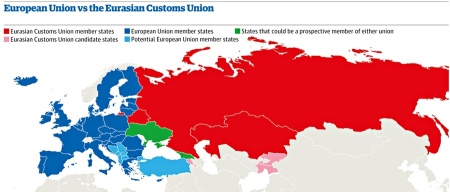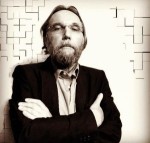Vladimir Putin’s proposed Eurasian Union would not have the economic or military strength of the United States or the European Union. Its significance may be otherwise—an ideological rallying point to those who reject Western liberalism.
Liberalism in this context means more than the ideas of the New Deal Democrats in the United States. It means the whole modern movement toward increasing freedom, reason and tolerance, fostered by free-market capitalism, free scientific inquiry, free elections and respect for human rights.
These ideas are so taken for granted in the USA that we Americans forget that many people in the world give priority to other values—community, tradition, national solidarity, cultural identity and obedience to legitimate authority. This is not limited to the countries of Putin’s Eurasian Union.
The appeal of anti-liberal philosophies is strengthened when Washington justifies invasion of foreign countries and unchecked corporate rule in the name of freedom and democracy.
China, the central Asian countries and Iran share an interest in the economic integration of the interior of Eurasia. Construction of railroads and pipelines will inevitably draw these countries closer together. But they also have in common political philosophies that reject individualism and value stability and unity, whether in the name of China’s Confucian-style Communism or Iran’s religious law, and this also will draw them closer together and away from the influence of the USA.
By the same token, to the extent that freedom, reason, tolerance and the other values of the modern world have appeal, people and nations will draw away from the Eurasian Union and toward the values of the European Union and the USA.
§§§
I’ve been reading about a Russian thinker named Alexandr Dugin, respected in Russian military and intellectual circles, whose name is mentioned in a current article by David Remnick in The New Yorker.
The world, for Dugin, is divided between conservative land powers Russia and libertine maritime powers the U.S. and the U.K.—Eternal Rome and Eternal Carthage. The maritime powers seek to impose their will, and their decadent materialism, on the rest of the world.
This struggle is at the heart of history. For Dugin, Russia must rise from its prolonged post-Soviet depression and reassert itself, this time as the center of a Eurasian empire, against the dark forces of America.
And this means war. Dugin rejects the racism of the Nazis, but embraces their sense of hierarchy, their romance of death.
“We need a new party,” he has written. “A party of death. A party of the total vertical. God’s party, the Russian analogue to the Hezbollah, which would act according to wholly different rules and contemplate completely different pictures.”
Dugin has written a book about what he calls the “fourth ideology.”
The first ideology was liberalism, by which he means the values of the modern world, which in his view are inferior in every way to the values of the Middle Ages. The second ideology was Marxism, a critique of liberalism. The third ideology was fascism, a critique of both liberalism and Marxism.
Marxism and fascism both failed, in his view, is that they didn’t go far enough. What is required, in his view, is a fourth ideology that completely rejects liberalism—that is, democracy, capitalism, religious skepticism and individualism.
I don’t take his ideas as necessarily the guiding light of Russian foreign policy—rather as an indicator of the intellectual climate in Russia.
He’s not the only anti-liberal thinker that Remnick interviewed for his article, although he is the most extreme. What the anti-liberal thinkers have in common is hostility and cynicism in regard to the United States and our claims to stand for freedom and democracy—which may be exaggerated, but has some basis.
U.S. advocacy of gay rights is especially galling to illiberal authoritarians, because it represents the extreme of rejection of traditional values in the name of individual freedom. But it is not happenstance that Americans place so much stress on gay rights. It is one of the few human rights issues, along with feminism, that our leaders can affirm without hypocrisy—unlike trial by jury and respect for international law.
The significance of thinkers such as Alexandr Dugin for us Americans is to make us aware that there is no guarantee that our founding ideals will triumph or even survive. American freedom and democracy will exist only so long as Americans make the effort to understand their basic principles, defend these principles against opponents and carry them out in practice.
LINKS
THE FOURTH ESTATE: The Fourth Political Theory, a web site devoted to Alexandr Dugin’s ideas.
Unthinking Liberalism, a favorable review of Alexandr Dugin’s The Fourth Political Theory by Alex Kurtagic.
Vladimir Putin’s New Anti-Americanism by David Remnick for The New Yorker.
Putin’s long game? Meet the Eurasian Union by Leon Nehfakh for the Boston Globe.
Putin’s rebooted Soviet Union is weak and doomed by Zack Beauchamp for Vox.
Sanctioning Eurasianism by Paul Robinson for Irrussianality. The case against worrying too much about Dugin’s ideas. [Added 7/7/2015]
§§§
One more thing. When the Eurasian heartland does become an integrated economic unit, its center of gravity will be China, not Russia.
[added 8/6/14]
The Errand-Boys of Europe by Padraig Murphy for the Dublin Review of Books.
The roots of Putin’s Russian nationalism, an earlier post of mine.
Putin’s Brain: Alexander Dugin and the Philosophy Behind Putin’s Invasion of Crimea by Anton Barbashin and Hannah Thoburn for Foreign Affairs.
Tags: Alexanadr Dugin, Anti-Liberalism, Eurasian Union, Eurasianism, Russia


August 5, 2014 at 8:07 pm |
Ah, Dugin.
I’ve thought his writings are heavy and I can never read more than a few thousand words before giving up due to the style (and some of the obnoxious elements like the gay-bashing) .
I suppose he’s basically a Nationalist, even if he doesn’t like that term and recognizes the shortcomings of statist ideologies.
Besides that, I think Dugin’s claim to inventing a philosophy is similar to the way that some people claim that Ayn Rand has a “philosophy”. But reading her, I didn’t really see anything clearly structured beyond a modernist-utopian belief in the goodness unregulated markets which, with some vaguely fascist undertones.
There are better writers than Ayn Rand, who present the case for unregulated markets as a primary value in structuring society (I don’t agree with this, but there are serious and very well written arguments out there) — without the modernist-utopian and the fascist flavors. I wouldn’t be surprised there are better ones than Dugin too, who advocate a Russian synthesis of capitalism, socialism, realism, nationalism, statism, and who knows what else.
I sure hope the folks in the Russian government don’t take Dugin’s writings too seriously. But then our government seems to have really believed in the Robert Kagan’s and Francis Fukuyama’s out there.
In any case, I do believe that hybrid philosophies, like the kind Dugin is reaching for, are viable, and can be successful by some measures. For example, China’s unparalleled success with “capitalism with Chinese characteristics”. Or how the US periodically abandons free market principles, or the rule of law, in the interest of exercising power to “defend” the abandoned principles, which in a way is successful, in the sense that it has beaten all opposition thus far.
LikeLike
August 5, 2014 at 8:25 pm |
I should clarify that Dugin can speak very coherently about philosophy. When comparing him to Rand, I was talking about the “positive” (i.e., not anti-something) body of ideas I thought he is proposing.
LikeLike
August 5, 2014 at 8:56 pm |
Oh, another thing… this post is a gold mine of ideas by the way…
The positive ideals in the second paragraph sound like ideas from the “enlightenment”, rather than from “modernism”, although maybe i misunderstand those terms.
LikeLike
August 5, 2014 at 9:02 pm |
“Enlightenment” would have been a better word. By “modernism,” I meant the values associated with the rise of the modern world, e.g., modernity, and not the various 20th century movements in art and literature which are labeled modernism.
LikeLike